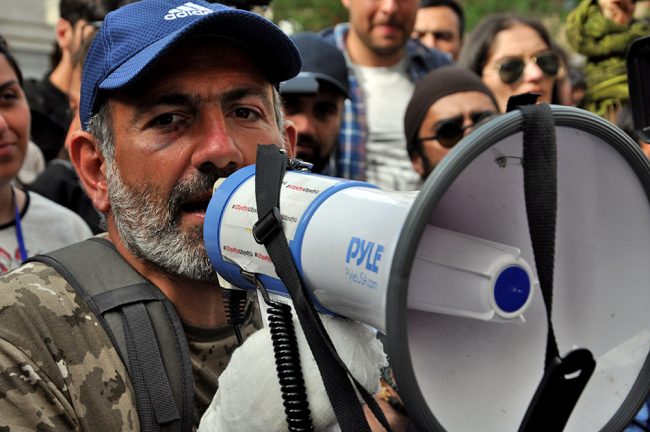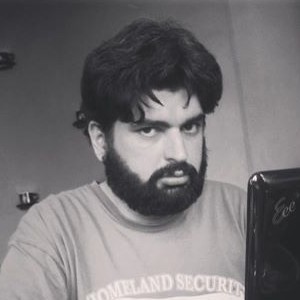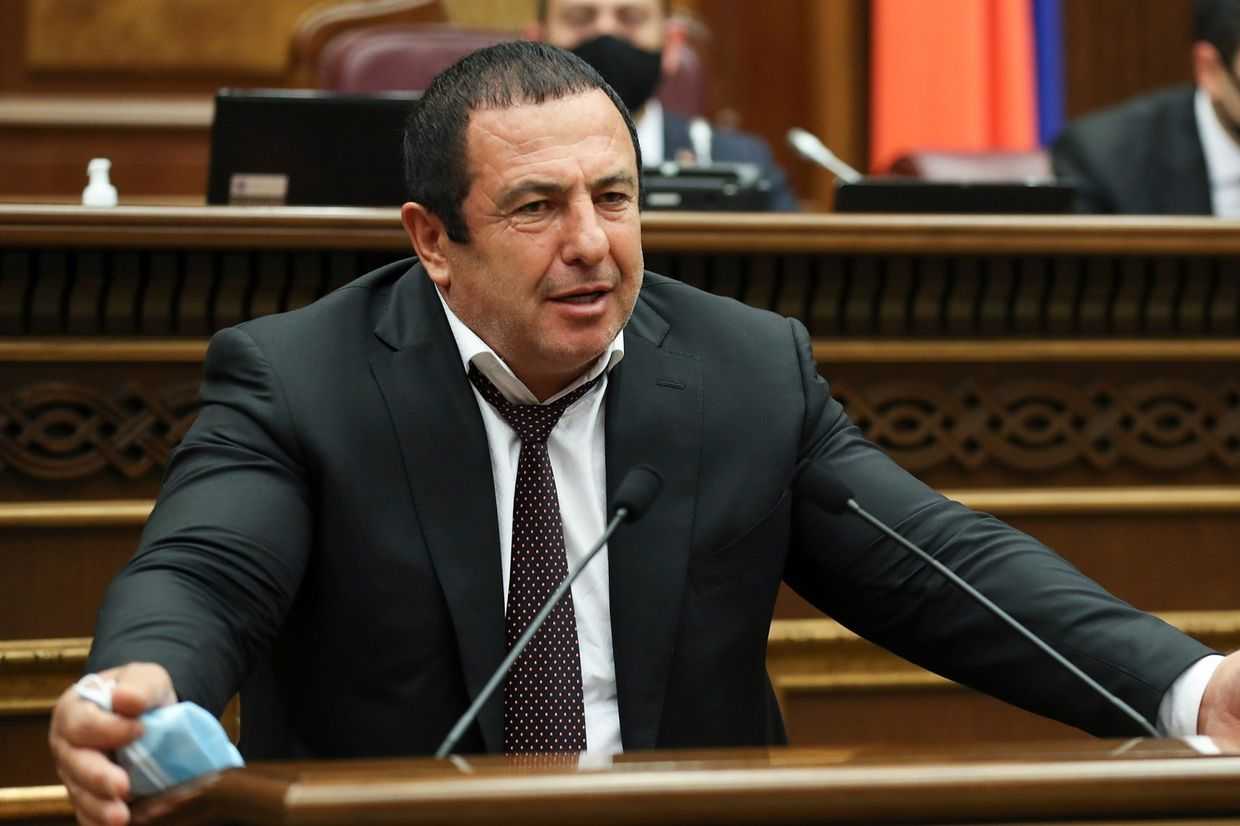


Drawing inspiration from the likes of Mahatma Gandhi and Nelson Mandela, Armenia’s opposition leader Nikol Pashinyan is being vague about the details of his political agenda not to alienate his newly found lot of supporters.
Tomorrow, the Armenian parliament will be voting once again on the candidacy of Nikol Pashinyan, and he is expected to be elected prime minister.
Since the course of events in Armenia has defied predictions many times in the last month, no one in Armenia is absolutely sure what will happen tomorrow. If Pashinyan is elected prime minister, it will be the first case in post-Soviet Armenia where someone with no prior connection to the ruling elites has made it to the top.
Unlike the leaders of most post-Soviet countries, Pashinyan is not related to either the Soviet elites, or the late 1980s pro-democracy movements, the two main sources of origin of post-Soviet elites. True, at some point Pashinyan was an ally of Armenia’s first president Levon Ter-Petrosyan, but this relationship developed when Ter-Petrosyan was already in opposition, in the 2000s.
Born in 1975, Pashinyan was simply too young at the time the Soviet system collapsed. And, while some of his peers chose to advance their careers through the Republican Party’s youth wings, Pashinyan chose a very different path.
‘The man of the people’
Pashinyan himself mentioned Mahatma Gandhi and Nelson Mandela as his role models. Looking back at Pashinyan’s biography, he seems like a crossover between a professional revolutionary à la Leon Trotsky or Fidel Castro, and nonviolent movement leader in the style of Mahatma Ghandi or Martin Luther King.
Pashinyan’s career trajectory, which included time spent as an opposition journalist and then as a political activist, with stints in hiding and in jail, finally culminating in the ‘velvet revolution’, has been shockingly distinct from the career paths of the majority of his colleagues-to-be; the heads of other post-Soviet governments.
Even when compared to the leaders of the ‘colour revolutions’ in Georgia, Ukraine, and Kyrgyzstan, all of whom came from the ranks of the previous political elites, Pashinyan seems to be a true ‘man of the people’.
The path of a revolutionary
Born in the provincial town of Ijevan in northeastern Armenia, Pashinyan moved to Yerevan to study journalism at Yerevan State University. He started working as a journalist while still a student, but was expelled in 1995. Officially, it was due to his absence from his classes, but it is commonly believed that the real reason for the expulsion was that Pashinyan had voiced accusations of corruption against one of the professors.
In the late 1990s, Pashinyan founded the newspaper Haykakan Zhamanak, which by the mid-2000s became the flagship of Armenian opposition media. It was from this position that he entered politics, establishing the Impeachment electoral block, which campaigned (unsuccessfully) in the parliamentary race of 2007.
In 2008, Pashinyan became one of the leading activists of the protest movement led by former president and presidential candidate Levon Ter-Petrosyan. After the disputed 2008 presidential election, in which Serzh Sargsyan was declared the winner, round-the-clock protests started in the centre of Yerevan. Pashinyan became one of the most recognisable voices of the protest.
Ter-Petrosyan, whose speeches gave the impression of a university lecture, and Pashinyan, whose speeches were intense and emotional, provided a perfect mix for energising the protests. Their speeches were so popular, even techno remixes of them appeared online.
However, on 1 March 2008 the protests were crushed by the police: 8 protesters and 2 policemen died in the clashes. Opposition supporters believed that the outgoing president Robert Kocharyan and president-elect Serzh Sargsyan were personally responsible for the violence.
Pashinyan went into hiding, but a year later he surrendered to the police and was sent to prison. While Pashinyan was in hiding, he wrote a novel, and in prison he wrote a series of articles describing life in confinement, all published in his newspaper.
Finally, in 2011 he was released due to an amnesty, and joined Ter-Petrosyan’s newly created political block Armenian National Congress. He became a member of the parliament in 2012, but soon had a falling out with Ter-Petrosyan, and, with several dozen supporters, mostly younger activists, founded his own party, Civil Contract.
In 2015 he refused to support the opposition’s campaign against the constitutional referendum suggested by Sargsyan, a step that drew criticism from many opposition activists, who accused Pashinyan of ‘selling out’ to the government.
Accusations of conformism grew even stronger in 2017, when Pashinyan and two other parties that had formed the Yelk coalition together with the Civil Contract accepted the parliamentary election results as legitimate. In that election, marred by accusations of voter bribing and administrative pressure, Yelk received a bit more than 7%, while the Republicans took about 49% of the vote. Looking back, it seems to be a strategic concession, aimed at securing the block’s place in parliament and having the ability to act as the only viable opposition force.
What does Pashinyan believe in?
Even among Pashinyan’s supporters there is a certain lack of clarity about his ideological views and policy preferences. As for international observers, both Western and Russian, Pashinyan remains pretty much a dark horse. The international media are used to dividing post-Soviet politicians into ‘pro-Western liberal democrats’ and ‘pro-Russian conservative nationalists’. Pashinyan’s case does not entirely fit into either categorisation.
Throughout his career, Pashinyan has been mostly associated with the liberal-democratic wing of the political spectrum and has been critical of Armenia’s foreign policy, particularly its accession to the Russia-led Eurasian Economic Union. However, any signs of pro-Western or anti-Russian attitudes were conspicuously absent from the recent protest movement.
Throughout the protests, Pashinyan went out of his way to stress that movement had no anti-Russian agenda, or, for that matter, any foreign policy agenda at all. Only when Pashinyan became a candidate for the prime minister’s post, he started discussing his foreign policy agenda. He made statements assuring Moscow that he was not going to reverse any of the decisions taken by his predecessors, including Armenia’s membership in the Eurasian Union and the Collective Security Treaty Organisation, or object to the presence of Russian military bases (in Gyumri and the Erebuni Airport) and Russian border guards in Armenia.
At the parliamentary hearing, the Republicans attempted to provoke Pashinyan into voicing criticism of Russia, apparently in an attempt to secure Russian support. Pashinyan, however, calmly repeated his assurances about preserving Armenia’s foreign policy priorities, and rejected the Republicans’ claims that he had links to Mikheil Saakashvili, Aleksey Navalny, or the US State Department. However, he has also repeatedly said that he was devoted to multi-vector foreign policy, vowing to implement the CEPA agreement with the EU, and listing visa-free travel to Schengen area as one of his priorities. Pashinyan claims that his foreign policy will be neither ‘pro-Western’ nor ‘pro-Russian’, but ‘pro-Armenian’.
The Nagorno-Karabakh issue
The Republicans also attacked Pashinyan claiming that his position on the Nagorno-Karabakh conflict was ‘defeatist’, and even presented a quote from a 2001 article by Pashinyan to prove their point (Pashinyan claimed that the quote was fake, with sentences taken out of the context). Whatever Pashinyan thought in 2001, today he says that he believes that no compromise can be achieved until Azerbaijan stops its militant rhetoric. It can be speculated, that if Pashinyan comes to power, he will take a cautious approach to the Nagorno-Karabakh peace process, especially as he will need time to get acquainted with the details of the negotiations.
In any case, the consequences of Pashinyan’s victory for the Nagorno-Karabakh conflict resolution process could be twofold. The arrival of a new leader, especially one with wide popular support, can open the door to new initiatives. However, it is difficult to predict the dynamic of any negotiations between Pashinyan and Aliyev, given the difference in their backgrounds and circumstances of their rise to power. Besides, even though Azerbaijan has so far refrained from attempts to use Armenia’s political instability to advance its goals in Nagorno-Karabakh, if the political turmoil in Armenia continues, the temptation to do so might just prove too great.
A New Armenia
When it comes to internal policies, Pashinyan’s agenda has been quite vague. So far, their agenda has been defined mostly in negative terms: rejecting corruption, oligarchy, monopolies, the collusion of officials with criminal networks, etc. Throughout the protests, Pashinyan and his supporters used somewhat populist rhetoric with leftist overtones, rallying against corrupt elites and advocating for social justice. They claim that a ‘New Armenia’ should be free of all these vices, but how exactly that will be achieved remains unclear. Pashinyan’s supporters argue that, as of today, it is too soon to discuss specific policies, since the most urgent issue is reforming the electoral code, and holding free and fair elections.
There are several reasons for this lack of clarity. Pashinyan’s success has been so meteoric that it was probably a surprise to even his most ardent supporters, so his team simply may have not had the time to design specific policies. Besides, talking about specific policies may alienate some of Pashinyan’s supporters, both on the streets and in the parliament, and today he badly needs to keep his coalition as wide as possible.
The Republicans still enjoy a majority in the parliament, and even if they do elect Pashinyan as prime minister, they have the opportunity to torpedo all his initiatives, at least in theory.
Finally, the political debate in Armenia is sometimes reminiscent of the old Soviet joke about a dissident who was detained for distributing leaflets that had nothing written on them, because ‘everybody knows everything anyway’. There is a wide consensus in Armenian society that the most urgent issues are dismantling the oligarchic system, cleaning the government system of corruption, and removing the government’s pressure on small and medium businesses.
Serzh Sargsyan and the Republicans’ rhetoric focused on all of these matters, even though their policies were very different in practice. As one Pashinyan supporter put it, even if he simply starts implementing what the Republicans have been saying all these years, it would still be a huge achievement for Armenia.






